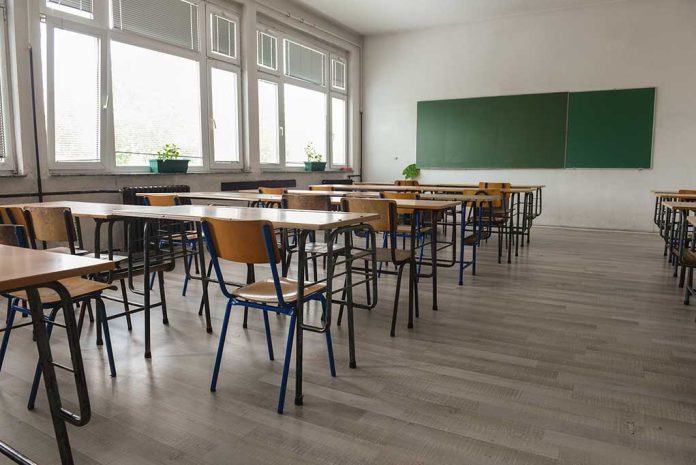
Governor Kelly Ayotte just delivered a stunning blow to teachers’ unions by signing universal school choice into law, transforming New Hampshire into the 17th state to fully embrace education freedom despite being a blue state that voted for Kamala Harris in November.
Key Takeaways
- New Hampshire has eliminated income caps on its Education Freedom Accounts program, making school choice available to all families starting July 2025.
- Families can receive at least $4,265 per child (up to $9,676 for children with additional needs) for private school tuition or homeschooling expenses.
- A 10,000-student cap is initially set, with a built-in 25% increase each year if enrollment exceeds 90% of capacity.
- New Hampshire is the first Democrat-leaning state to enact universal school choice, signaling a potential shift in education policy beyond traditionally conservative states.
- The move follows a nationwide trend of expanding educational freedom, which gained momentum after pandemic-related school closures frustrated many parents.
New Hampshire Breaks Educational Barriers
In a significant policy shift that reinforces parental rights in education, Governor Kelly Ayotte has signed legislation making school choice universal in New Hampshire. The new law eliminates previous income restrictions on the state’s Education Freedom Accounts (EFA) program, allowing families of all income levels to access state education funds for private schooling or homeschooling. Starting July 2025, nearly every family in the state will be eligible to redirect their child’s state education funding toward the educational environment of their choice, rather than being locked into their assigned public school.
“Giving parents the freedom to choose the education setting that best fits their child’s needs will help every student in our state reach their full potential. I’m proud to sign this into law today along with the Parental Bill of Rights, which ensures parents are the central voice in their children’s education. I thank the House and Senate for working to get these across the finish line,” Said Governor Kelly Ayotte.
The program will provide eligible families with at least $4,265 per student annually, with increased funding of up to $9,676 available for children with additional educational needs. The legislation initially caps participation at 10,000 students for the 2025-2026 school year, but includes a provision to automatically increase the cap by 25% each subsequent year if enrollment exceeds 90% of capacity. This graduated approach allows for controlled growth while ensuring the program can accommodate increasing demand from New Hampshire families seeking educational alternatives.
A Major Victory for School Choice Advocates
The expansion of New Hampshire’s school choice program represents a significant win for educational freedom advocates in a state that has historically leaned Democratic in national elections. This breakthrough legislation makes New Hampshire the 17th state to implement universal school choice and, notably, the first blue state to do so. The bipartisan appeal of the measure suggests that parental rights in education may be transcending traditional political divisions, especially in the aftermath of the COVID-19 pandemic when many public schools remained closed while private institutions reopened.
“New Hampshire is the 17th state to pass universal school choice in the past four years. The wind is at our backs and the momentum for education freedom is unstoppable. We have a state that went for Kamala Harris in November now going all-in on school choice. Putting parents in the driver’s seat should be a nonpartisan issue – kids don’t belong to the government – but the Democrat Party is a wholly owned subsidiary of the teachers unions,” Said Corey DeAngelis, senior fellow at the American Culture Project.
Opposition from Democrats and Teachers’ Unions
As expected, the universal school choice legislation has drawn sharp criticism from Democrats and teachers’ unions, who claim the program will drain resources from public schools and primarily benefit wealthy families who can already afford private education. These opponents argue that expanding the voucher program will create greater inequities in the education system and increase costs for taxpayers. However, supporters counter that the program simply redirects funds that would have followed students to public schools, ensuring that the money actually supports children’s educational needs regardless of setting.
“Get out your wallets folks. Wealthy people want subsidies from taxpayers like you to send their kids to private schools,” Said Rep. David Meuse, a Democrat.
School choice advocates point to the pandemic’s influence on the nationwide movement. DeAngelis noted that “the teachers unions really stepped in it by fighting to keep schools closed during the COVID era,” which frustrated many parents and sparked increased interest in educational alternatives. This groundswell of parental activism has translated into policy victories across the country, with New Hampshire now joining states like Arizona, which pioneered universal school choice in 2022 with a program providing approximately $7,000 per student. The trend shows no signs of slowing as more states consider similar legislation.
The Future of Education in the Granite State
New Hampshire’s bold move toward universal school choice signals a significant shift in the state’s approach to education policy. By removing income barriers to educational options, the Ayotte administration has prioritized parental authority over centralized control. The program’s structure, with its initial cap and built-in growth mechanism, allows for responsible implementation while acknowledging the likelihood of strong demand from families. Republican lawmakers have celebrated the law as fulfillment of their commitment to educational freedom, while state education officials view it as transformative for students across New Hampshire.
“With the passage of this bill, we are now able to deliver universal school choice for all New Hampshire families,” Said Sen. Victoria Sullivan, a Republican sponsor of the legislation.
As New Hampshire implements this ambitious school choice expansion, educators, parents, and policymakers nationwide will be watching closely. The program’s success could provide a blueprint for other blue and purple states considering similar reforms, potentially accelerating the nationwide movement toward educational freedom. By trusting parents to make educational decisions for their children and providing the financial means to execute those choices, New Hampshire has positioned itself at the forefront of a transformative approach to education that prioritizes families over institutions.



